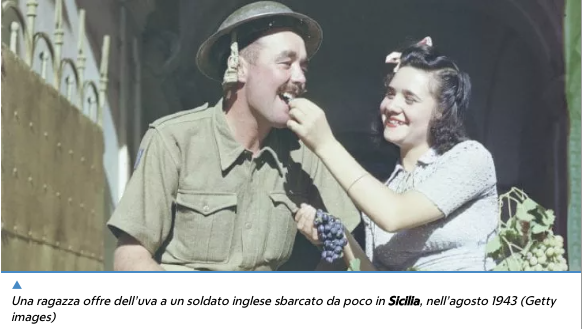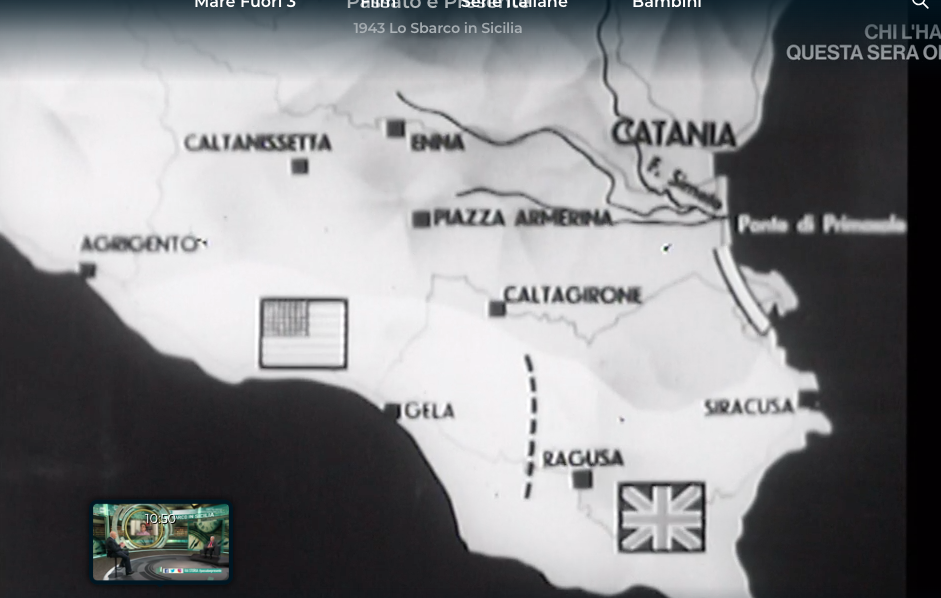Let’s hope it’s the last one!

On 9th July 2023, Sicily commemorated the 80th anniversary of operation Husky, codename for the invasion of Sicily by the Anglo-Canadian-American troops. A day that marked the beginning of the end of the Second World War. For the first time —eighty years from that evening— I discover what happened on that ominous day, at a conference organised by the local authorities in Caltagirone, a town 39 km away from the shores, where the Anglo-American troops landed. Apparently, the invasion of Sicily was the biggest landing operation in the history of Europe. In the first three days of the invasion, 150,000 troops, 7,000 vehicles, and 300 tanks were transported by sea, on 2600 vessels; while 4000 airplanes were ready to take off from the African basis.

On paper, the war had been lost already, but for a series of circumstances, Sicily had to pay a heavy price before the ‘liberation’.
Alfio Caruso, the author of ‘Un viaggio nella memoria – Caltagirone ’43’, talks about the number of bombs dropped, “on June 10 alone, the island was rocked by 1,500 tons of bombs”, about the carpet bombing going on for days on end, the deaths, the destruction, the mayhem, the terror. He talks about the battle between the Canadian troops and the Axis Force, who were retreating in a hurry, trying to reach the north of Italy, where the fascists were still in charge.
Although I have always been aware of the tragic events that occurred in the evening of the 9th July1943, I have never been familiar with the scale and length of the operation. In my family 4 people were killed, in one day, under the heavy bombing. Throughout my life, I have heard the same story over and over again. In my re-acting of the events, I have always imagined a few bombs dropped here and there, and lots of bad luck: being in the wrong place, at the wrong time. Now, I ask myself, why did it take me so long to learn about what happened? Why was I never aware of how long it took, how destructive it was, and how many people died? Why had the “liberation” always been presented like a walk in the park? It certainly wasn’t.
If we look at the narrative, from the post-war years till now, it’s not surprising how I could be misled. The newsreel footage of the time shows nothing but happy celebrations, smiling faces, clapping crowds, or American soldiers throwing chocolate bars and chewing gums to children. The landing in Sicily, has always been synonymous with the end of the fascist regime and the beginning of a new era. All shadows had to be removed, especially the number of casualties (civilian killed, 22,697), number of bombs (9,500 tons), of hours and days in which the population was subject to a fierce attack of a disproportionate force (the island was conquered in 38 days). Governments needed to celebrate the end of a long conflict, which had gripped most of the world for 5 years. They wanted people to be happy and optimistic about the future, even those who had lost their limbs, family and friends; but such are wars.
History repeats itself
Conflicts are tragic, and all countries involved in the Second World War suffered great losses and destruction. Nevertheless, I always have this strange and persistent feeling that what happens in Sicily is easily and frequently wiped out from history books. Although the truth is not always useful to the winners’ narrative, it’s necessary and it must be confronted at all cost.
Whatever happens on this island gets blown away by the wind. There is no memory of past events that lingers long enough for the next generations. Although history is all around us, we don’t see it. As a people, unknowingly, we have an absent-minded attitude towards the past. Like all colonies we don’t have a sense of our own history, it’s always someone else’s. The stories don’t get told: a striking example is how little is known about the Sicilian people who took up arms and fought against the Germans. There is no fuss, no commemorations, no medals, no celebrations. We get on with our lives, and we forget the past as quickly as we can. After all, it’s better to keep shtum, history happens always somewhere else. The “Mille” invaded Sicily in 1860, all forgotten of course, and just 83 years after, a new “liberation” was on its way. History keeps repeating itself. It has taken only 80 years for chronicles to crawl out of the rubble and reveal themselves in all their tragic glory.
There are beautiful books and documentaries on the occupation-liberation of Sicily. I would recommend ‘Gli Zii di Sicilia’ / ‘Sicilian Uncles’ by Leonardo Sciascia. While reading through the pages of this book, I recognised similar stories about the war, passed on in my family, from generation to generation. It’s also well worth watching the Rai documentary: 1943 Lo Sbarco in Sicilia
Something this year feels different. In this incredibly hot summer, the events are finally unravelling. On 16th July 1943, the Canadian troops captured Caltagirone, on 9th July 2023. Eighty years later, representatives of the Canadian army arrived in town to take part in the commemorative ceremonies and celebrations. Under an unforgiving sun, the names of the victims, from both sides, who died in Caltagirone, were read aloud during a commemoration. Number of soldiers and civilians killed during the Invasion of Sicily: Americans, 5,946; British, 2,721; Canadian, 562; Italian, 4,678; Civilians, 22,697.
The following evening, under a sky full of bright stars, the orchestra played swing and jazz music, reminiscent of the 1940’s, to celebrate the 80th Anniversary of the liberation, and the years of peace that followed. It’s only the beginning, but hopefully it will mark the starting point of our history, told by the people who lived through it. For Sicily, this is a long awaited victory.

This puts in mind a recent and eponymous hollywood film that sought to dramatise ‘Operation Mincemeat’. Not sure how or if that film looked at the impact on civilians, however. Either way, that’s a shocking death toll reported here. I will look up references you mention, particularly Leonardo
Sciascia. Now, Sicily is at new tragic front line; trafficked people fleeing conflict and hardship in flimsy boats, and climate.
"Mi piace"Piace a 1 persona
Yes, operation Mincemeat is another story. I don’t think I’m the right person to write about history. I almost gave up.
"Mi piace"Piace a 1 persona
Maybe not the history as in the textbooks, but definitely you can write about historical facts in your own style
"Mi piace"Piace a 3 people
“As a people, unknowingly, we have an absent-minded attitude towards the past. Like all colonies we don’t have a sense of our own history, it’s always someone else’s.”
Mi stavo quasi commuovendo leggendo questo tuo pezzo (di solito lo sai, leggendoti si ride :)) sarà perché poche settimane fa è capitato che mio padre mi raccontasse della “liberazione” della città di Cosenza, dove peraltro tedeschi non ce n’erano; ovviamente la logica USA è sempre stata di ammazzare tutti, tanto per fare prima. Volevo dirti, non trascurare (inteso come: don’t overlook) il tuo ruolo, i tuoi strumenti e quello che puoi fare tu per la tua terra: tu sei nata per raccontare.
A presto chiacchierata su Zoom! 🎆🎈🏵🌹
"Mi piace"Piace a 2 people
Grazie! Ho levato tanto perché stava diventando troppo lungo. Inoltre ci ho messo tantissimo a scriverlo, diversamente dagli altri racconti.
"Mi piace"Piace a 2 people
The historical novel/fiction route into writing more on this (don’t give up!) is varied and wonderful – there’s Antonio Tabucchi, for starters, at less than 500 pages. The first few pages here https://archive.org/details/sostienepereirau0000tabu
"Mi piace"Piace a 1 persona
I have never read anything by Tabucchi. I’ll check him out. Thanks!
"Mi piace""Mi piace"